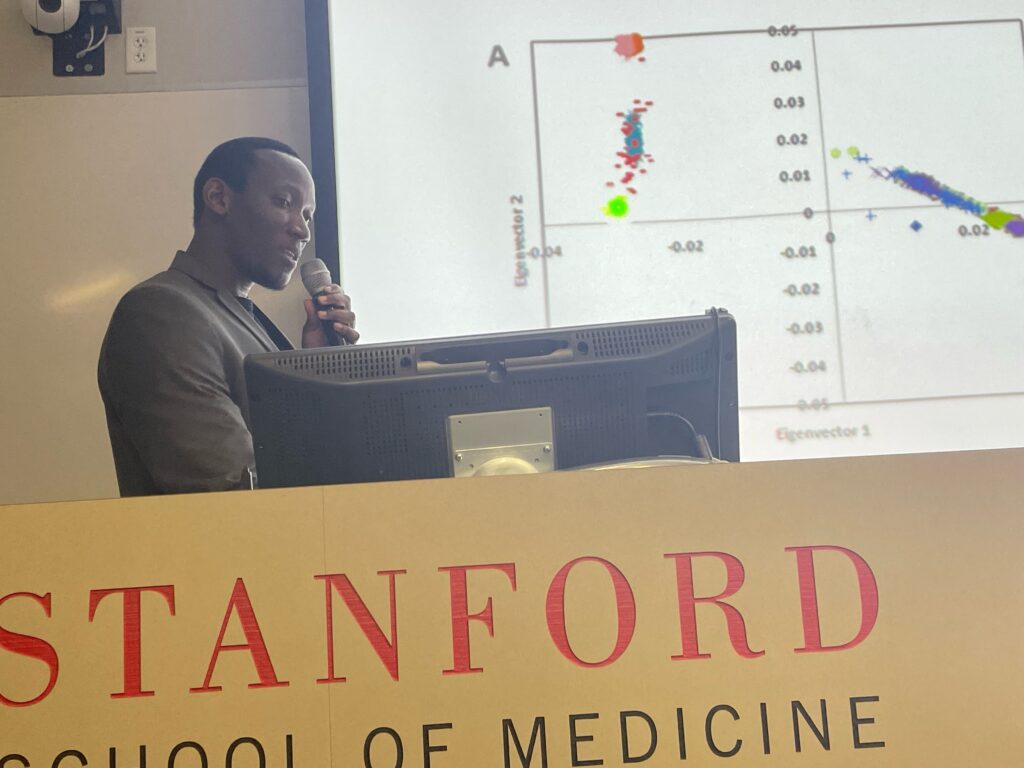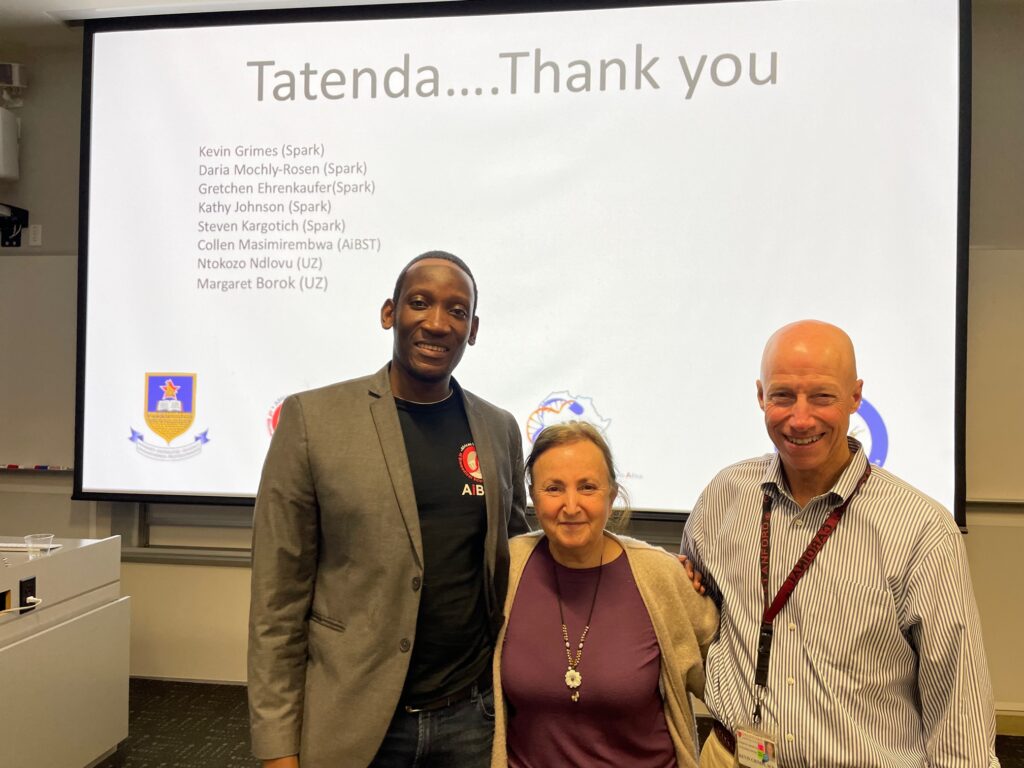Published: 03/15/2024
Can personalized therapy based on genetic variations improve patient outcomes and reduce inequities?
By Jamie Hansen, Communications Manager
As an oncologist in Zimbabwe, Tinashe Mazhindu has observed a high number of patients who experienced severe side effects from common cancer treatments. While the symptoms seemed to occur at random, Mazhindu suspected the patients’ genetics might be playing a significant role.
“Without any information to go on, we could only manage the side effects when they occurred, even if it might lead to injury to patients,” Mazhindu said.
Mazhindu began researching innovative approaches to patient care. He realized that a more personalized approach, in which doctors consider a person’s genetics when prescribing drugs and dosages, could help improve cancer outcomes and save lives and resources.
Mazhindu decided to pursue a PhD in clinical pharmacogenomics, a type of precision medicine that investigates how genetic variations impact a person’s response to a treatment and allows physicians to customize the dosage to optimize health outcomes. Now, he’s designed a clinical trial, which will soon launch in multiple centers in several African countries, to assess how using pharmacogenomics could help reduce adverse drug reactions and improve patient outcomes.

Mazhindu, a physician by training, credits the Stanford SPARK Translational Research Program with providing him the training and expertise to design the innovative and wide-ranging hybrid implementation clinical trial, which he hopes will help revolutionize cancer treatment and management on the continent.
Pharmacogenomics: A Pathway to Equitable Cancer Care in Africa
Across the world, people in different regions have developed subtle differences in their genetic code, or polymorphisms, to help them adapt to the climatic, environmental, infectious, and other local pressures of that region. While these variations have helped people survive deadly illnesses such as malaria, they can also have unintended consequences, said Kevin Grimes, co-director of Stanford SPARK along with Daria Mochly-Rosen, PhD, and Mazhindu’s mentor at Stanford. This includes differences in how individuals process or react to certain medications.
Yet many common cancer drugs were tested and customized for patients in Western or European countries where they were developed — resulting in unintended inequities in patient outcomes in other parts of the world.
For instance, some people process cancer medications slower than others because of certain polymorphisms, which can lead to toxicity, sickness, and hospitalization.
Tinashe MazhinduI knew there must be something we could do to predict which patients would get this toxicity level and which ones wouldn’t.
“I knew there must be something we could do to predict which patients would get this toxicity level and which ones wouldn’t,” Mazhindu remarked, pointing to the challenges in treating diseases like gastrointestinal cancers, his specialty. Some of the most common and cost-effective gastrointestinal cancer treatments were never tested in Africa. They can cause severe side effects or toxicity among a significant proportion of African patients.
A 2023 study found that using pharmacogenomics to customize cancer treatments reduced adverse drug effects by 30% with varying degrees of impact across participating countries. Yet Mazhindu noted that only 1% of the study’s participants were Africans, emphasizing a lack of data from the continent.
Now, a new initiative launched by the African Institute for Biomedical Science and Technology (AiBST) in Zimbabwe with a multi-year grant from the Bill and Melinda Gates Foundation seeks to combat this dearth of data by expanding the capability for genetic and pharmaceutical medicine in Africa. In 2021, Prof. Collen Masimirembwa, the institute’s founding president and chief scientific officer, received the grant to establish pharmacogenomic implementation centers across Africa. He established the Consortium for Genomics & Therapeutics in Africa and hired Mazhindu as the co-leader of the initiative.
Precision medicine is often viewed as an expensive form of care only available to those with the most resources. Yet Mazhindu and his colleagues at AiBST and the University of Zimbabwe believe this custom approach could be particularly useful in low-resource settings.
“We hypothesize that limited-resource settings most require precision in cancer care because they have fewer resources to manage the toxicities,” Mazhindu said. Implementing a pharmacogenomics program in Africa could help minimize toxicity, maximize a drug’s efficacy, save families money in places where cancer treatment is paid out of pocket, and preserve hospital resources, he added.
He set out to design a study to understand the genetic variants that impact patient treatments in Africa — and develop a recommended standard of care to improve the outcomes of patients with these variants.
Stanford collaboration sparks pioneering study blueprint

As Masimirembwa and Mazhindu planned their ambitious study, which they hoped to adapt for a range of settings, drugs, and diseases as part of a project called iPROTECTA, they decided to leverage their connections with Stanford SPARK. SPARK is multidisciplinary center at Stanford that connects researchers with industry expertise to help ensure that their findings benefit patients. Masimirembwa is the director of a global branch of SPARK in Zimbabwe, and Stanford has hosted several young researchers from Zimbabwe to support their career development in recent years.
“The scientists in Africa we’ve worked with are brilliant and hardworking. They’re just resource-constrained and haven’t been exposed to some of the applied science in drug and diagnostic development,” said Grimes, a professor of chemical and systems biology and a global health faculty fellow at the Stanford Center for Innovation in Global Health. He sees SPARK’s contribution as just the beginning, as the researchers return to their home institutions and share the skills they’ve gained with others.
Mazhindu spent several months during the spring of 2023 at Stanford, working with Stanford mentors and industry advisors to design his study.
“I came to Stanford because I felt this great sense of responsibility and I thought this was not something we could afford to do a rushed job on,” Mazhindu said. “We needed expertise we lacked in our country in terms of designing this study platform. Stanford gave me that and way, way more than I expected.”
Tinashe MazhinduI came to Stanford because I felt this great sense of responsibility and I thought this was not something we could afford to do a rushed job on
Working alongside Grimes, and experts in oncology and clinical trial design, Mazhindu spent his time at Stanford learning and refining the study design. Mazhindu said a course in essential clinical research allowed him to apply his learnings directly to the protocol as he was developing it. Stanford’s data science department helped Mazhindu find a way to effectively use a smaller sample size to maximize financial resources. Mazhindu’s time at Stanford also informed the development of a new research component. He will conduct a second, qualitative study to interview healthcare workers and assess barriers to implementing pharmacogenomics as a standard of care in Africa.
In recognition of the ways in which his time at Stanford impacted the project, Mazhindu now refers to the study blueprint as the “SPARK Palo Alto Protocol.”
A study designed to “impact patients today”
Kicking off in Zimbabwe this spring, Mazhindu’s study integrates genotype testing with typical bloodwork to enhance medication selection and dosage.
“We will also take into consideration their genetic information as far as how they process the drug,” said Mazhindu, who previously helped map unique genotypes across Africa. Using this data, doctors will identify patients with unique African gene variants. Those patients will receive their first treatment according to the current standard of care since no information yet exists to guide their dosage. The physicians will closely monitor patients’ responses to treatments and adjust dosages in response to potential toxicity risks. They’ll also measure whether the recommended drug dose is effective in fighting the patient’s cancer.
Ultimately, Mazhindu hopes the study will produce a new set of recommendations that African clinicians can use when treating people with cancer that accounts for the genotypes most common in Africa. The study will also benefit patients of African ancestry living in other parts of the world.
Tinashe MazhinduIt has taken us 20 years to find these variants that are important for Africans,” Mazhindu said. “It should not take us 20 more years for this knowledge to start impacting our patients. That’s why we designed our studies to impact patients today.
“It has taken us 20 years to find these variants that are important for Africans,” Mazhindu said. “It should not take us 20 more years for this knowledge to start impacting our patients. That’s why we designed our studies to impact patients today.”
Grimes said he’d love to see this pharmacogenomic approach become a routine part of drug development. “Obviously, people from all over the world deserve the best healthcare they can get, and this science could have been done for a long time. We need to think about that and move beyond white Europeans when we develop new drugs. It’s really a justice issue.”
Kevin GrimesObviously, people from all over the world deserve the best healthcare they can get, and this science could have been done for a long time. We need to think about that and move beyond white Europeans when we develop new drugs. It’s really a justice issue.
In the spirit of quickly advancing pharmacogenomics in Africa, the SPARK Palo Alto protocol was designed to be highly adaptable for different diseases and contexts. Already, Mazhindu and his collaborators have found applications for the study ranging from assessing pain management for breast cancer patients in South Africa, to investigating the efficacy of sickle cell treatments in Nigeria, to Mazhindu’s work on gastrointestinal cancers in Zimbabwe. Future studies will explore the use of pharmacogenomics in the treatment of tuberculosis, which sickens more than 2.5 million people each year in Africa.
“We as African researchers have a responsibility to do these studies and actually alter the treatment for some of these easily available drugs so that we can optimize the outcomes for our cancer patients,” Mazhindu said.
Cover image credit: Unsplash.com

